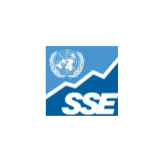SSE, IFC, Kenya CMA and Nairobi Stock Exchange are building momentum for more sustainable capital markets- at home and abroad
4 March 2019
 (4 March 2019) The Capital Market Authority in Kenya (CMA) and the Nairobi Securities Exchange (NSE) joined the IFC and UN Sustainable Stock Exchanges (SSE) initiative in engaging listed companies and issuers of securities in Kenya on the topic of improving ESG communication with investors. At the Workshop in Nairobi, the partners provided an overview on the strategic value and demand for better annual reporting and disclosure practices.
Paul M. Muthaura, CEO of the Capital Markets Authority in Kenya, said: “the Nairobi Securities Exchange and Capital Markets Authority in Kenya are increasingly active in promoting sustainable finance. But we can benefit from technical assistance to implement sustainable finance mechanisms. We are pleased today to announce the strengthening of our ties with IFC and UN SSE, with the aim of improving our assistance to issuers and listed companies, so that we can reap the rewards of sustainable finance.”
The overall goal is to help build investor trust, attract capital, and grow strong local capital markets. This is the core of a new partnership between the IFC, a member of the World Bank Group, and the UN Sustainable Stock Exchanges (SSE) initiative.
“We often get questions on the extent to which investors are really looking at ESG factors. The growth of the PRI is a good proxy for global interest in ESG issues from investors around the world. PRI’s more than 2200 signatories – mainly institutional investors – have committed to incorporate ESG factors into investment decisions, to better manage risk and generate sustainable returns,” said Danielle Chesebrough, Senior Analyst with the PRI and UN Global Compact, representing the SSE initiative. “We have also seen a strong growth in public policies either mandating or creating incentives for increased reporting on ESG factors from companies, as well as policies asking investors to increase their own disclosure of how ESG factors are integrated in their investment process.”
“Well-functioning markets require investor trust,” said Manuel Moses, IFC’s Country Manager in Kenya. “Through our partnership with the UN Sustainable Stock Exchanges Initiative, CMA Kenya and NSE, we seek to build this trust in Kenya through greater transparency and reporting. Ultimately, this will help responsible companies attract investors and reduce the cost of capital.”
The Workshop sought to improve integrated reporting and disclosure practices and strengthen ESG disclosure and reporting requirements for issuers and listed companies in Kenya. It is part of an ongoing advisory program in coordination with J-CAP. IFC has already provided support to the development and implementation of the Kenya Corporate Governance Code, Scorecard and Stewardship Code.
The 2018 Report on the State of Corporate Governance of Issuers of Securities identifies that disclosure and transparency practices of issuers in Kenya is one of the areas identified as needing improvement. The other two are Ethics and Stakeholder Engagement. Investors say a lack of consistent and easily accessible information on companies’ ESG performance is an impediment to increasing the allocation of capital to emerging markets. Adhering to high standards of disclosure and transparency can mitigate some of the perceived risks of investing in emerging and frontier markets revolving around weaker corporate governance and heightened social and environmental risks.
Market regulators and stock exchanges are uniquely positioned to advance greater transparency and disclosure of material information that enables investors to make better decisions. They can do so by setting best-practice for ESG disclosure by listed companies. This can help build a strong foundation for well-functioning markets, drive improvements in business practices, and channel more capital towards sustainable companies.
IFC and the UN Sustainable Stock Exchanges initiative, which exchanged letters for collaboration in October 2018, focus on disclosure and transparency program to help local stock exchanges to produce ESG disclosure rules that meet specific local needs and enhance low-risk emerging markets investments. This work will draw on IFC’s recently released Disclosure and Transparency Toolkit for companies, investors, capital market officials and regulators and the UN Model ESG Reporting Model Guidance. Since the toolkit’s release in January 2018, it has been used to develop market and regulatory guidance in Kazakhstan, Kenya, Nigeria, Peru, Georgia and the Philippines.
(4 March 2019) The Capital Market Authority in Kenya (CMA) and the Nairobi Securities Exchange (NSE) joined the IFC and UN Sustainable Stock Exchanges (SSE) initiative in engaging listed companies and issuers of securities in Kenya on the topic of improving ESG communication with investors. At the Workshop in Nairobi, the partners provided an overview on the strategic value and demand for better annual reporting and disclosure practices.
Paul M. Muthaura, CEO of the Capital Markets Authority in Kenya, said: “the Nairobi Securities Exchange and Capital Markets Authority in Kenya are increasingly active in promoting sustainable finance. But we can benefit from technical assistance to implement sustainable finance mechanisms. We are pleased today to announce the strengthening of our ties with IFC and UN SSE, with the aim of improving our assistance to issuers and listed companies, so that we can reap the rewards of sustainable finance.”
The overall goal is to help build investor trust, attract capital, and grow strong local capital markets. This is the core of a new partnership between the IFC, a member of the World Bank Group, and the UN Sustainable Stock Exchanges (SSE) initiative.
“We often get questions on the extent to which investors are really looking at ESG factors. The growth of the PRI is a good proxy for global interest in ESG issues from investors around the world. PRI’s more than 2200 signatories – mainly institutional investors – have committed to incorporate ESG factors into investment decisions, to better manage risk and generate sustainable returns,” said Danielle Chesebrough, Senior Analyst with the PRI and UN Global Compact, representing the SSE initiative. “We have also seen a strong growth in public policies either mandating or creating incentives for increased reporting on ESG factors from companies, as well as policies asking investors to increase their own disclosure of how ESG factors are integrated in their investment process.”
“Well-functioning markets require investor trust,” said Manuel Moses, IFC’s Country Manager in Kenya. “Through our partnership with the UN Sustainable Stock Exchanges Initiative, CMA Kenya and NSE, we seek to build this trust in Kenya through greater transparency and reporting. Ultimately, this will help responsible companies attract investors and reduce the cost of capital.”
The Workshop sought to improve integrated reporting and disclosure practices and strengthen ESG disclosure and reporting requirements for issuers and listed companies in Kenya. It is part of an ongoing advisory program in coordination with J-CAP. IFC has already provided support to the development and implementation of the Kenya Corporate Governance Code, Scorecard and Stewardship Code.
The 2018 Report on the State of Corporate Governance of Issuers of Securities identifies that disclosure and transparency practices of issuers in Kenya is one of the areas identified as needing improvement. The other two are Ethics and Stakeholder Engagement. Investors say a lack of consistent and easily accessible information on companies’ ESG performance is an impediment to increasing the allocation of capital to emerging markets. Adhering to high standards of disclosure and transparency can mitigate some of the perceived risks of investing in emerging and frontier markets revolving around weaker corporate governance and heightened social and environmental risks.
Market regulators and stock exchanges are uniquely positioned to advance greater transparency and disclosure of material information that enables investors to make better decisions. They can do so by setting best-practice for ESG disclosure by listed companies. This can help build a strong foundation for well-functioning markets, drive improvements in business practices, and channel more capital towards sustainable companies.
IFC and the UN Sustainable Stock Exchanges initiative, which exchanged letters for collaboration in October 2018, focus on disclosure and transparency program to help local stock exchanges to produce ESG disclosure rules that meet specific local needs and enhance low-risk emerging markets investments. This work will draw on IFC’s recently released Disclosure and Transparency Toolkit for companies, investors, capital market officials and regulators and the UN Model ESG Reporting Model Guidance. Since the toolkit’s release in January 2018, it has been used to develop market and regulatory guidance in Kazakhstan, Kenya, Nigeria, Peru, Georgia and the Philippines.
About IFC
IFC—a sister organization of the World Bank and member of the World Bank Group—is the largest global development institution focused on the private sector in emerging markets. We work with more than 2,000 businesses worldwide, using our capital, expertise, and influence to create markets and opportunities in the toughest areas of the world. In fiscal year 2018, we delivered more than $23 billion in long-term financing for developing countries, leveraging the power of the private sector to end extreme poverty and boost shared prosperity. For more information, visit www.ifc.orgAbout the SSE
 The SSE initiative is a UN Partnership Programme organised by UNCTAD, the UN Global Compact, UNEP FI and the PRI. The SSE’s mission is to provide a global platform for exploring how exchanges, in collaboration with investors, companies (issuers), regulators, policymakers and relevant international organizations, can enhance performance on ESG (environmental, social and corporate governance) issues and encourage sustainable investment, including the financing of the UN Sustainable Development Goals. The SSE seeks to achieve this mission through an integrated programme of conducting evidence-based policy analysis, facilitating a network and forum for multi-stakeholder consensus-building, and providing technical assistance and advisory services.
The SSE initiative is a UN Partnership Programme organised by UNCTAD, the UN Global Compact, UNEP FI and the PRI. The SSE’s mission is to provide a global platform for exploring how exchanges, in collaboration with investors, companies (issuers), regulators, policymakers and relevant international organizations, can enhance performance on ESG (environmental, social and corporate governance) issues and encourage sustainable investment, including the financing of the UN Sustainable Development Goals. The SSE seeks to achieve this mission through an integrated programme of conducting evidence-based policy analysis, facilitating a network and forum for multi-stakeholder consensus-building, and providing technical assistance and advisory services.









